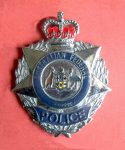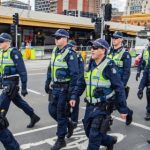Australian Federal Police Broadcasts Plans to Arrest Suspect

The Australian Federal Police (AFP) recently embarrassed itself when part of a discussion on plans to arrest a suspected North Korean agent were broadcast over social media. The hiccup is the latest in a number of bungles that have plagued the federal law enforcement agency over recent years.
The West Australian revealed on December 19 that its staff became aware of the internal discussion that was being broadcast over live streaming social media application Periscope, after a link to it was sent out on the AFP Twitter account.
The tweet was quickly deleted, but the minute long conversation involving AFP media staff remained available online until the West Australian alerted the agency. Around 40 people listened the broadcast while it remained available online.
A suburban undercover operative
During the December 13 conversation, AFP staff were discussing plans to arrest a suspected North Korean agent on December 19. Details of the operational briefing, along with the timings of the arrest and the need to brief top politicians, were discussed.
The name of the suspect, Choi Han Chan, was not revealed. The 59-year-old South Korean man was arrested in the Sydney suburb of Eastwood the following Saturday. He was subsequently charged with brokering the sales of weapons of mass destruction on behalf of North Korea.
The man, who has lived in Australia for 30 years, has also been attempting to sell North Korean coal to entities in Indonesia and Vietnam.
In regard to the social media posting of the arrest details, the AFP confirmed that the incident was a mistake. At the time, staff members had been testing out the Periscope app, and steps have since been taken to ensure that similar incidents don’t occur again.
Illegally accessing information
The recent social media leak follows the admission back in April that an AFP investigator had breached metadata laws earlier this year, when the officer accessed the call records of a journalist without the required warrant to do so.
AFP commissioner Andrew Colvin said that the breach was a “human error,” which had occurred during the investigation of a leak from within the agency. The commissioner stressed that what had been illegally accessed were the records of the calls, and not their content.
The journalist whose metadata had been accessed was not informed of the breach. However, the matter was referred onto the Commonwealth Ombudsman, so they could launch an investigation into it.
The flawed metadata scheme
The federal government’s controversial mandatory metadata regime, which requires telcos and ISPs to retain the metadata of all customers for two years, first began operating in October 2015. But, the full version of the scheme only came into play on April 13 this year.
Journalist information warrants were a last minute addition to the original metadata legislation. They were an added provision that were supposed to protect the privacy of journalists’ sources. But, as the AFP has shown, these provisions can easily be overlooked.
Bombs left at the airport
Another major AFP bungle occurred when a woman was given a bag of plastic explosives at Sydney airport that had been left behind by an AFP bomb dog trainer almost a month before.
On August 14 2014, a woman who’d flown to Sydney from Adelaide complained to Virgin staff that her bag had been damaged during her flight. One of the staff members told her that she’d be supplied with a replacement from a number of unclaimed bags.
What neither of them knew was the bag provided was lined with 230 grams of explosives. The woman, who then travelled to Cessnock to stay with her parents, didn’t discover the explosives until three weeks later.
She then took the bag to Cessnock police station on September 9. The woman showed officers at the counter what was in the bag, and this caused an evacuation of the building. And following an investigation, NSW police traced the bag back to the AFP.
Former AFP Sydney airport commander Wayne Buchhorn apologised to the public for the misplaced explosives. He explained that the “canine instructor that inadvertently left” the devices behind was going to be subjected to a full investigation.
Sitting on sensitive information
In April 2012, the AFP received a tip-off from Canadian authorities about a number of suspected Australian pedophiles. The law enforcement agency was provided with the names, addresses and credit card details of people who’d bought pedophile materials from a Canadian website.
However, the AFP didn’t start revealing the suspects’ details to state police until mid-2013. By the time Queensland’s Argos Taskforce detectives received the information, they were already making arrests, as they’d found out about the materials in early 2013 via their own Canadian police links.
The AFP stated that there was no evidence that any children were at an unacceptable risk. But, Queensland officers had already removed six children after further investigations had uncovered other materials.
Raiding the wrong residence
And another AFP blunder enabled a Norwegian fugitive to avoid detection for a decade. Camilla Ellefsen Lunetta entered Australia in 2003, after abducting her own daughter in the US. She evaded police detection for many years after initial attempts to track her down by the AFP failed.
In the early hours of May 27 2006, AFP officers descended upon a house in Goonengerry, a town located southwest of Mullumbimby. The officers believed the mother was staying in the residence with her then five-year-old daughter Reya.
However, the AFP officers surrounded the next-door neighbour’s house by mistake. And by the time officers made their way to the correct house, the mother and daughter had fled. Although, Tweed-Byron police assisting in the raid said it was unclear whether the mistake had led to her escape.
After the botched AFP raid, Ms Lunetta was able to elude authorities until 2013, when news.com.au reported that she was then living in Sydney’s eastern suburbs.
Reya’s father came to Australia from the US to reunite with his daughter, while Ms Lunetta was eventually allowed to return to Norway with the girl.








